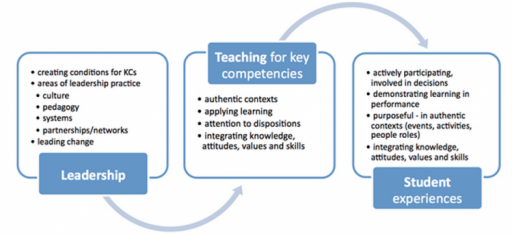Leadership and the key competencies
Learners are most likely to develop and strengthen their capabilities for living and learning when they learn with teachers in a school whose leadership creates conditions that stimulate key competencies.
The key competencies element of The New Zealand Curriculum brings with it exciting possibilities for making students’ experience of learning more relevant, engaging, meaningful, and useful. Key competencies-rich programmes will enable students to be confident, connected, actively involved learners in the present and in the future. They will encourage lifelong learners who are equipped to participate in rapidly changing local, national, and global communities.
Giving effect to key competencies in ways that address their complexity will entail significant challenge and change. Tackling those challenges and compelling change to support key competencies is a vital role for school leadership. Effective leaders create the conditions required for key competencies in teaching and learning. They need to ensure that the culture, pedagogy, systems, partnerships, and networks in their school support key competency development. Leaders also need knowledge and skills in leading change since, for many, key competencies require, and make possible, a significant change in practice.
View a text version of this diagram.
Pedagogy
Pedagogy: Do we know and do the things we need to do to develop key competencies for our learners?
Leadership of the key competencies is strengthened when leaders are directly involved in evaluating teaching and learning, through regular classroom visits, and formative and summative feedback. Leaders’ expertise about key competencies is vital for increasing leadership influence on teaching and learning, and understanding best how to support the key competencies in their school. To develop that expertise, leaders will need to both promote and also participate in professional learning about key competencies with their teachers.
Focusing on teaching quality
What might you attend to during classroom visits in relation to important aspects of key competencies (such as students’ integrating knowledge, attitudes, values and skills; applying learning; authentic contexts; learning dispositions)?
How might what you know about key competencies inform your evaluations of teaching practice?
What formative and summative opportunities have you arranged for feedback to teachers in relation to key competencies?
Are there shared understandings in your school about what effective practice for key competencies looks like?
What might you observe students experiencing or doing in a key-competencies rich programme?
Leaders and teachers learning about key competencies together
What formal opportunities have you taken to learn with your teachers about key competencies?
How has that learning contributed to your understanding of the conditions leaders could create for teachers and students working with key competencies?
Conversations for change
Have you promoted opportunities for teachers to inquire into what they currently do and how it relates to their students' current competencies, and how these could be improved?
To what extent have you engaged in conversations that tackle tough issues about changes to teaching and learning to support the key competencies?
Have those conversations enabled you to understand why teachers do the things you seek to change (engaging teachers’ theories of action)?
Have you led discussions about the relative merits of ‘old’ and ‘new’ practices in the context of key competencies?
Published on: 06 May 2014
Return to top


